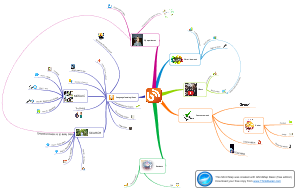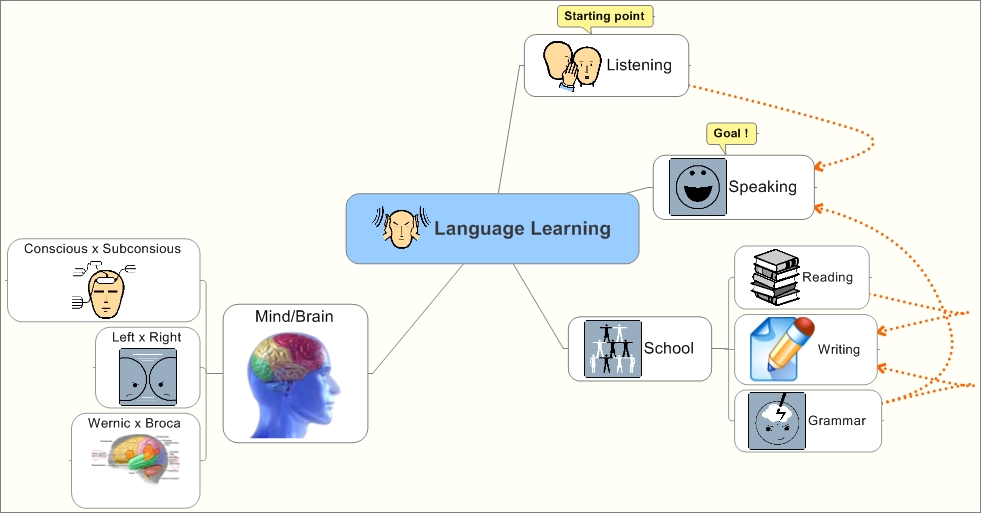|
Thank you Mike ;-) for the correction of this mistake, not necessary to sing a song anymore!
0 Comments
look at that:
At this phase of the process we need to start very learning activities. We have text, it is already known text „indexed“ by us using our native language. And we have of course an audio version of that text /actually it is vice versa – we have the transcript of that audio – with that audio will work more / I would prefer a material narrated by a native speaker(s) (to learn a proper English). It could be for example some audio book, part of some movie, interesting lecture or a program… it is up to you. It should be something you like, you are interested in or something you need for your job or school anyway... Shortly something which has meaning for you. The amount of it (the length) depends on your knowledge. If you are a beginner, 1 or 2 minutes or even less could be enough, if you are already advanced – it could be 1 hour or more! So, you have the „training“ material and you are already familiar with that material because of the preparation you have done (see part 1. I call it here „indexing“). Now you will need to make it the part of your integral knowledge, the part of your brain. How to do it? Do not read it over or over again, or even worse: do not try to learn unknown words directly (=classical approach)! It is not effective and it will lead you (in most cases) only to losing interest in learning the language after very short period of time:-( You need to LISTEN and your mother tongue written (indexed) will be your helper. This is the phase, where your mother language will help you. Listen and at the same time read - read YOUR MOTHER TONGUE „indexed“ above the foreign text. You can stop your MP3 player from time to time to be able to keep with it. At the same time IMAGIN the meaning of what you are listening. Use your so called RIGHT hemisphere of the brain. Do it several times. This phase needs from you focus and attention. You need to be fully engaged. It is slightly strange to read a text in your mother tongue (but in order of the foreign one=even stranger) and at the same time listening its foreign equivalent. This is the fist part of all the process. After while you will not need to read anymore and you will understand well anyway. Still use your imagination. You are learning to understand INSTANTLY, no need for internal translation. And now you can go to the second stage – now you will need to FIX that new acquired knowledge into your subconscious mind. How to do it? You need to listen it over and over again, for hours and hours! Children do it the same way to learn from their parents. It is the natural way (although from our perspective it does not look like that) We are using modern technologies to simulate that process for ourselves and to accelerate it using already achieved knowledge. Yes, it needs time and we do not have to much spare time in our culture today! And I tell you: it will not take any time from you. You only need to create a new HABIT for yourself = to be able to listen while doing other activities (watching TV, washing up dishes, working, exercising, driving, commuting … whatsoever-gradually you would be able to do even more complex and intellectually demanding activities). You do not need to pay attention to the listening at all. Actually this phase needs your „non attentiveness“! In this phase you need to „teach“ your subconscious mind from which you will gather these information later. Your conscious mind was engaged in the 1. phase. So, record your material into MP3 player, use 1 head-phone only (not to be cut off the real life) and you can listen nonstop over and over again. It should be rather silent! During this process you will find that in some moments you perceive the language you are listening, sometimes you will forget about it completely. And it is fine! /both/ During day you can use this 2. phase and later at home (for example) you can do the 1. phase of conscious learning. The ratio between them could be 1:5 till 1:10 Gradually you can stop reading that „indexed“ text in 1. conscious phase (if you are advanced, you can stop already in early stages). How long to do it all? You will need to do these processes for a few days or even weeks to get a solid foundation for your new „language house“ you are building. The goal here is to understand this material (and be able to imagine what you are hearing) the same way as if it were your mother tongue. If you reach this level, you can transfer to the next phase which I am going to describe the next time :-)
So, to be continued ... In my previous post I came with the concept of language as a mosaic. I promised to explain how to achieve that. First of all, I would like to say one thing - I am learning myself and I read my previous post a few minutes ago and I could see my mistakes - so, should I be ashamed of them or be happy that I have move forward again with my knowledge of this beautiful language? This is, of course, just rhetorical question.
To learn language naturally means to do a lot of mistakes and be able to correct them on your own. You do not need any teacher to do it for you. What you need is model, example to follow, to imitate. The children have as examples from real life their parents at the beginning. They do not need to go to school to learn mother tongue. When they go to school they already know it. But you can say: it takes them around 6 years, but I need to know English much more quicker! My answer is: YES, you CAN! The language-learning is ongoing process, newer ending. But to reach some level of mastery, when you are able to understand and express what you need, does not take too long. Although it is very individual. The main thing is to do it right! And what is that "right" way? I will tell you my opinion here, based on (not only) my experiences. We, learners of some language, let's say that it is our second language, started having already knowledge of some language, our mother one. And it is a big advantage (if used correctly - I will explain later). A child is starting from scratch. It does not know anything. Every word has its (internal) meaning and the child must recognize it. The child learns from experiences, observations, seeing situations... This process is relatively slow at the beginning but it creates very strong foundation, very deeply "hard-wired" knowledge which is very helpful and learning of the child gradually accelerate. This is not often the case of us, the adult learners of foreign language, unfortunately. Why? We should have the advantage of our developed brains, knowing of one language and knowing internal meaning of words... The reason is that we try to use our mother tongue to "help" us with the new language we are learning the wrong way. We are mixing these languages together and the "winner is" our mother tongue. And we will return to it abandoning frustrated new language we are learning. Tired after a big unneccessary effort. The RIGHT way is this: At the beginning (ONLY) you need to "use" your mother language to KNOW what is the meaning of new language you are learning. The good example is a method of V. F. Birkenbihl. In her method she writes words in the mother language above (or below - it does not matter) that foreign text to know the meaning of that text. It is in order in which they are in the foreign text! And this is important. It matters! The foreign language is "the boss here" ;-) Our mother one is only helper (and a temporary helper) We will not learn words that way as we are accustomed to learn at school - that (classical) approach connects new foreign and mother word together and creates such a "couple" in our head. This is not natural. We need only know the meaning of foreign word without this unbreakable (unnatural) connection. The result of this new approach is that we will have such words as something like synonymous words in our head. So, we have the foreign text, we know its meaning of it by using our mother tongue (not “normal” way). What next? If you have a meaning, you can learn. And we have it now. So, let's get the ball rolling! To be continued ... The more you know, the easier you learn. Is it true as far as a language is concerned? Really? Not always. But it is exciting perspective! Isn't it? It is not about remembering more and more words, expressions, adding a new vocabulary to the existing one, which demands continues repeating and revising and represents a continues effort to maintain and keep what you already know – not to be forgotten. Despite the fact, that in most cases it is this way, there is here an another, a different approach. It is to see the language as MOSAIC. The lexical units are the pieces of a broader picture, the whole which represents not only the collection of that pieces but IS much more than that, because it has a MEANING. That picture, that mosaic represents the meaning expressed by the language, is created from those pieces. If you have a mosaic, you do not need to know all pieces to figure out the picture – the meaning. And it works vice versa too – you can “easily” figure out missing pieces (meaning of unknown words in our case) from the broader picture, mosaic (=context). This way you can learn, and this process is natural way of learning new vocabulary. In addition to that, you can also notice some grammar patterns and you can find that some words go together (collocations). You learn them too. Naturally. This “mosaic” approach significantly improves your understanding – it is instantaneous, without any internal translations, no need for mixing languages anymore, no need for thinking about grammar rules, actually there is no need to think at all (“about” language) – just communication happens! So, isn't it nice? Yes! You can ask: “But how to achieve that?“ And it is the relevant question! I will explain it, but not now. Think of it, maybe you are going to get it! The hint is: we do not have only a logical mind.
DO YOU SPEAK ENGLISH AS A SECOND LANGUAGE? IF YOU ARE MORE COMFORTABLE READING AND WRITING THAN TALKING TO PEOPLE, THERE'S A NEW E-BOOK THAT CAN HELP YOU GAIN CONFIDENCE WHEN SPEAKING! IT'S THE "Brain Speak Activator"
Assess your skills - ENGLISH SURVEY: http://www.brainspeakactivator.com/survey.html Sometimes I think of my English and I know that it is not perfect at all. I am not very confident, especially as far as the grammar is concerned. When I was younger, I had studied this language at school. We combined our mother Czech with English, it was a lot of grammar, theory, exercises. Yes, I understood them, but only that particular hour, next was another grammar rule and it was the same. Gradually I realized that I have a big mess in my head. An it has not changed to this day :-) Maybe, fortunately for me, I started few years ago looking at English from a little different perspective and maybe because of it I was able to continue to learn and actually I love this language today. What happen? I realized that all of that is nonsense. I realized that I do not need all this knowledge ABOUT the language, I need USE this language, understand it, be able to speak and write... NO grammar rules too much needed. I realized that when I was a little boy I did not learn any grammar too. Yes, at school it started and actually it does not helped me to be more FLUENT in my mother tongue – Czech. Maybe to the contrary :-( While speaking I do not have time to think about any grammar rules, I need to focus my attention to the topic I am saying, to the message I am delivering and to my partner in communication. I found that it is better to make mistakes, but to be fluent and natural than NOT TO BE ABLE to communicate at all. By the way, most of the time I speak with not-native speakers and they “do not now” too, and if with native ones – they are tolerant :-) So, I follow the rule: "Always Do Your Best" what is, I think, the 4-th agreement by Migual Ruiz. Hopefully the right grammar will come later too! With my Czech it was the case after all. What about you?
|
AuthorSelf-employed computer specialist and Qigong practitioner MIND MAP nAVIGATION
Archives
December 2013
Categories
All
Be in touch
|
| You can search our website here |





 RSS Feed
RSS Feed


